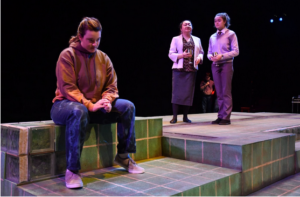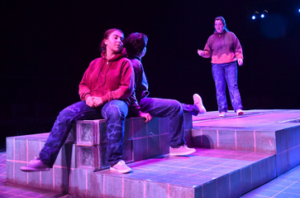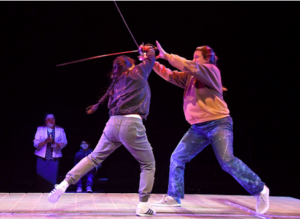Under Friday evening’s rain on November 11, 2022, I got the biggest comfort of the day: watching Shakespeare’s Hamlet, adapted and directed by Terrell Donnell Sledge, Artist-in-Residence in Theater and Dance, in a small stage setting in Austin Arts Center. This was my first experience with theater at Trinity, and I was pleased to see how such a production came about.
The story follows prince Hamlet, whose father has just passed and whose mother just remarried to his uncle, who is the current king. After Hamlet witnesses the alleged ghost of his father, King Hamlet, he devises a plan for revenge on his uncle, King Claudius. Obsessed with revenge, Hamlet rejects his lover, Ophelia, who eventually drowns mourning for her lost father. At the same time, King Claudius also has a plan to murder Hamlet. The play ends in a tragedy when half the characters die, including Hamlet, Claudius, and Gertrude, the queen.
The stage setting was particularly fascinating as the audience was seated around the stage, around a custom design platform in the round, unlike the usual proscenium set up of Goodwin Theater. The platform itself proved to be versatile. It served as a dance space for the dancers, and a part of the stage served as a coffin for Ophelia’s death. It was also where people sat, stood, and went about. When I walked in, I was nervous that some of the scenes or some actors’ facial expressions might be obscured, but it turned out I was able to witness every small bit of the production. The cast was on constant move throughout the stage so the audience never missed a thing!

Another element that I found surprising was the corporealization of Hamlet’s ethos and pathos, making Hamlet’s dilemma more visual and therefore more appealing to watch. Hamlet was played by three actors, one as Hamlet, the other two as Hamlet’s ethos and pathos. When Hamlet was in his contemplations, ethos and pathos became more active and assertive than ever. The light design contributed significantly in highlighting Hamlet’s thought processes. When Hamlet was alone and ethos and pathos started to play out in his head, the lights were darker with shades of blue and red. Someone entered, Hamlet’s headspace dispersed and the lights immediately switched to normal white light.

My biggest commendation goes to the talented cast of Hamlet, whose passion for theater has inspired me greatly! I was personally intrigued by the sword fight between Hamlet and Laertes. The actors must have practiced it in earnest! Generally, the cast’s ingenuity in portraying different characters, the exactitude of emotions and nuances in their voices, the unwavering effort to re-perform the piece four times for the whole community, has convinced me of their talent and dedication.


Hamlet has overall convinced me of the talent showcased in the Theater and Dance Department. I highly encourage Trinity students to go to performances on campus just because they are definitely worth it. Catch me at the next theater performance at Trin!